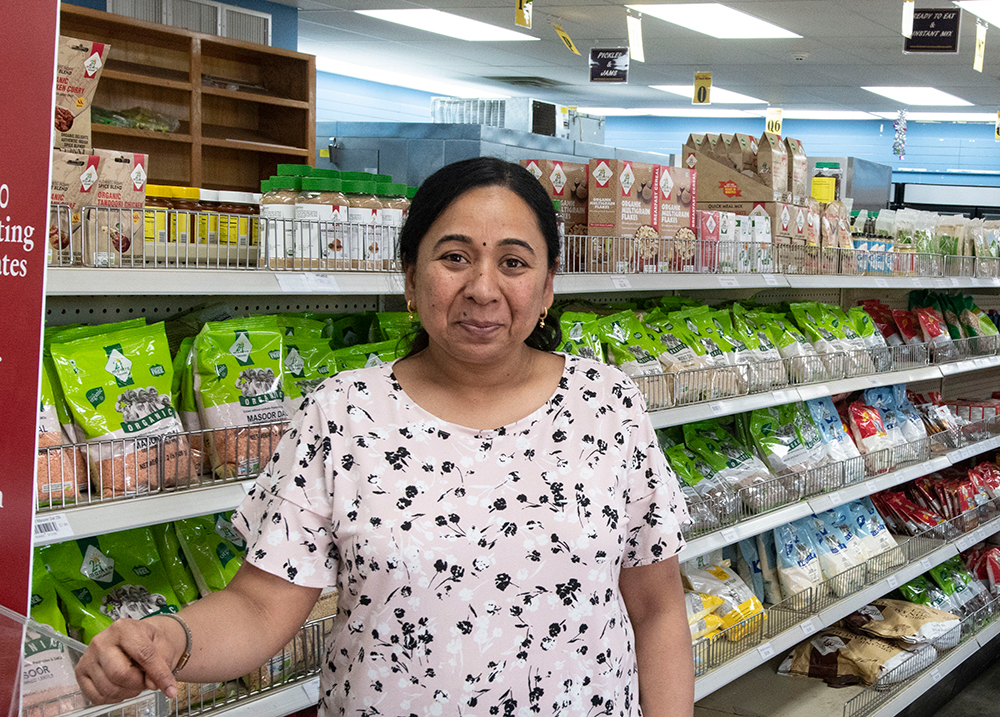East by Northwest Asian communities flavor Arkansas foodways
By Annemarie Anderson and Ava Lowrey
Often documentary fieldwork can be a lonely experience. As much as documentarians spend our days connecting with people and chasing the social and professional high of a great interview, we often end our nights alone in a hotel room with field notes, takeout, and occasionally a glass of wine in a plastic cup.
This trip was different. We set out together to create a larger collaborative project about the immigrant foodways that have shaped northwest Arkansas. In preparation for our Summer Field Trip to Bentonville, Arkansas, we talked with locals and explored the surprisingly diverse food community of the Bentonville-Springdale metro area. We visited Asian markets, Indian restaurants, and a halal butcher shop.
When Tom and Anna Tang moved to northwest Arkansas in the 1980s, there were few Asian-owned businesses and no Asian grocery stores. Using family recipes, the Tangs opened the first Chinese restaurant in the town of Siloam Springs, about thirty miles from Bentonville. New China was the first of several successful Tang family businesses centered around Chinese food.
Much has changed since the Tangs opened their first business. Tom and Anna Tang retired shortly before their daughter, Shu Lan Tang, and her husband, Bryan Winzer, moved back from a brief stint living in Japan and Hong Kong. Upon their return to Arkansas, Shu Lan and Bryan faced down the reality of a two-hour drive to Tulsa, Oklahoma, for ingredients and dining experiences they had grown accustomed to easily acquiring in Japan and Hong Kong. They longed for restaurants that served dim sum or char siu and grocery stores that stocked umeboshi.
Shu Lan saw an opportunity and opened Tang’s Asian Market in 2013. It was one of the first East Asian markets in northwest Arkansas. In addition to specialty groceries, the market serves prepared deli goods and boxed lunches—duck, char siu pork, or pork belly. Shu Lan’s father, Tom Tang, roasts the beautifully glazed ducks that hang from the meat counter.

Like the Tangs, Bindu Sreepathy and her husband, Raja Bavirisetti, confronted the hardships of finding familiar food in northwest Arkansas. Today, they own Flavors Indian Cuisine, Kwality Ice Cream and Grill, and World Food Mart grocery store in Bentonville. When they moved to town in 2009, Indian grocery staples were hard to find.
Originally from the state of Andhra Pradesh in Southern India, Bindu had moved to Houston, Texas, with Raja when they were married in 2007. It was easy to source Indian ingredients in Houston. “I never felt that I was not in India when I was living in Houston,” she said. “But when I came [to Bentonville], that’s when I realized it’s not.”
Bindu learned to adapt the recipes she knew. When she couldn’t find bitter melon or snake gourd, she made curries out of celery. She used seasonal vegetables from the Bentonville farmers’ market and experimented with vegetables from the Walmart produce section.
In 2011, Raja decided to go into business. They opened their first restaurant, Taj Indian Cuisine, with partners on Walton Boulevard, right beside Walmart Headquarters. That restaurant morphed into Flavors Indian Cuisine. In 2015, Bindu and Raja opened a grocery store, World Food Mart.
When World Food Mart opened, it sold Indian products. Gradually, they added goods from Latin America and the Middle East.
“This town is not just Indians. It’s everybody,” remarked Bindu. “So, when we have so much ethnicity, why just restrict ourselves to one community?” Today, bags of mustard seeds sit beside La Costenita brand dried chiles. Customers fill their baskets with Maggi masala noodles and rose syrup.
As World Food Mart and Tang’s Asian Market show, immigrant-owned restaurants and groceries are a nexus for the many immigrant communities who now call northwest Arkansas home. In all of these spaces, from the Salvadoran tiendas to Tang’s Asian Market in Springdale, you will also find white Arkansans enjoying pork buns and pupusas. Have lunch at Flavors on a weekday, and you might sit by Walmart employees on their lunch break, chatting over bowls of sambar or plates of butter chicken. For many, these places are glimmers of familiarity in a new landscape, and they broaden the definition of Southern food.
As we wrap up Arkansas field work, these spaces—and the foods, aromas, people, and stories that fill them—make us hopeful. And hungry.
Annemarie Anderson is SFA’s oral historian. Ava Lowrey is SFA’s former Pihakis documentary filmmaker.




